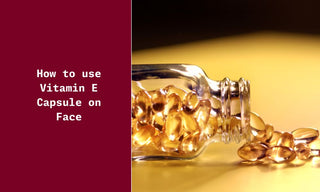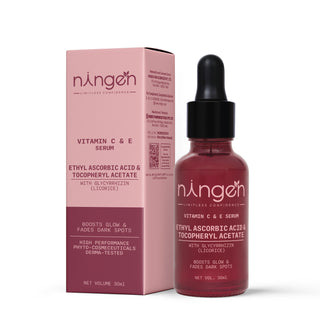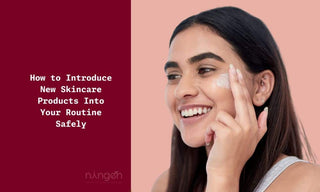Are you ready to reveal your skin's natural radiance? Step into the world of Vitamin E in skincare!
This guide delves into the art of integrating Vitamin E capsules into your regimen for a glowing complexion. Explore various applications, from moisturizing masks to targeted treatments, tailored to your skin's requirements. Delve into the antioxidant properties of Vitamin E, combating free radicals while enhancing skin elasticity and renewal. Dubbed the skin's guardian, Vitamin E is an antioxidant powerhouse, providing armor against environmental harm, while drenching the skin in vital moisture and taming inflammation. Grasping its mechanisms lays the groundwork for harnessing its full potential.
Join us on this exploration of Vitamin E's benefits, how to use vitamin E capsules on face, unlocking the key to healthy, luminous skin that emanates from within
In this Article;
- What is Vitamin E?
- Benefits of Vitamin E for the Skin
- Different Forms of Vitamin E
- Determining Your Skin Type
- How to Incorporate Vitamin E into Your Skincare Routine
- Step-by-Step Guide to Applying Vitamin E Capsule on Face
- Tips and Precautions for Using Vitamin E Capsule on Face
- Additional Tips for Healthy Skin
- Wrapping Up
- TL;DR(Too Long; Didn't Read)
- Frequently Asked Questions
What is Vitamin E?
Vitamin E, a potent fat-soluble antioxidant, shields skin cells from free radical damage, crucial in averting aging and diseases. Tocopherol, the primary form found in skincare, aids in skin health, immune support, and cellular repair. Abundantly present in foods like oils and nuts, it's also prevalent in skincare products, prized for moisturizing, healing, and anti-inflammatory benefits. Often paired with Vitamin C for added skin defense, it's essential to assess skin type and sensitivities before integrating topical Vitamin E into skincare.
Benefits of Vitamin E for the Skin
Vitamin E is a powerhouse when it comes to fostering healthy skin. Serving as a vital player in skin care, vitamin E capsules or oil can be directly applied to the face to reap numerous benefits. It can assist in nourishing and protecting the skin from various concerns, such as the damage caused by solar radiation and environmental pollution. Regular application can potentially reduce the visibility of scars and dark spots, contributing to an even skin tone and improved overall skin texture. Furthermore, for those seeking anti-aging advantages, vitamin E supports skin elasticity and may help to soften the appearance of fine lines. In skincare products, it is often deployed as a supporting ingredient to reinforce the effectiveness of other nutrients, such as Vitamin C, working in harmony to amplify the skin's defense against oxidative stress.
Antioxidant Properties of Vitamin E
The antioxidant properties of vitamin E are central to its role in skincare. Antioxidants are substances that help neutralize free radicals—the rogue molecules that contribute to tissue damage and aging. By incorporating vitamin E into your skincare routine, you can provide your skin with a line of defense against these reactive particles. This preventive measure helps in maintaining the integrity of skin cells, leading to a vibrant and youthful appearance. The unique capability of vitamin E to act as a protective barrier also means that it can extend the life of other oxidative-sensitive ingredients in skincare formulations, such as Vitamin C, making the products more effective.
Moisturizing Effect of Vitamin E
For those battling with dry skin, vitamin E is a savior due to its potent moisturizing effect. It acts as an emollient, which means that it helps to keep skin hydrated by locking in moisture. Application of vitamin E oil can be especially beneficial during harsh weather conditions when the skin is prone to dryness and flakiness. Even individuals with oily skin can integrate vitamin E into their skincare arsenal, as it balances the skin's natural oils and does not leave a greasy aftermath when used in moderation. Its moisturizing properties are also beneficial in promoting skin repair and can be particularly soothing after exposure to sun or environmental irritants.
Anti-Inflammatory Properties of Vitamin E
Vitamin E possesses anti-inflammatory properties that can benefit a wide variety of skin types. Inflammation is often at the root of skin issues such as redness, swelling, and irritation. Utilizing vitamin E can help soothe these symptoms, making it a useful ingredient for those with sensitive skin or inflammatory conditions like eczema or rosacea. Moreover, its calming effects can also accelerate the healing process of minor cuts, scrapes, and burns, making vitamin E an all-rounder in skin recovery. When used regularly, it can help keep skin calm and comfortable, reducing the need for more aggressive treatments.
Different Forms of Vitamin E
Vitamin E is not a single entity but encompasses a group of fat-soluble vitamins with distinctive antioxidant properties. There are eight chemical forms of vitamin E: four tocopherols and four tocotrienols. These forms vary in their level of biological activity and potency, with alpha-tocopherol being the most active form recognized in the human body. In skincare, vitamin E is available in multiple formulations, each suited for different product types and skincare needs.
Vitamin E can be found naturally in various foods such as nuts, seeds, and vegetable oils, and is available as a dietary supplement. In addition, its oil is commonly used in cosmetic products due to its skin-beneficial properties. Vitamin E is versatile and can also be synthesized for use in supplements and skincare products.
Vitamin E Oil
Vitamin E oil is a concentrate of vitamin E, usually in the form of tocopherol, which can be directly applied to the skin or mixed with other skincare formulations. The oil is typically thick and can range in color from pale yellow to amber. It is renowned for its powerful antioxidant properties and is a staple in many skincare enthusiasts' routines.
When purchasing or using vitamin E oil, it's crucial to consider its concentration, as this varies between products. Some oils are intended to be applied undiluted, while others are meant to be mixed with a carrier oil like coconut oil, jojoba oil, or almond oil to improve skin absorption and reduce the potential for irritation.
Vitamin E Capsules
Vitamin E capsules offer a convenient way to reap its benefits internally and externally. Encasing precise doses of vitamin E oil, they can be ingested or applied topically. When used topically, simply snip the capsule and apply to targeted areas like scars or dry patches. Mixing with a carrier oil enhances absorption. Vitamin E, in both forms, enriches skincare routines, offering moisturization and enhanced skin resilience, tailored to individual needs.
Note: When considering the use of vitamin E oil or capsules for skin application, always perform a patch test to ensure you do not experience any allergic reactions or skin sensitivities. Additionally, it's important to pay attention to the correct dosage and consult with a healthcare provider before making adjustments to your skincare or supplementation regimen.
Determining Your Skin Type
Determining your skin type is a critical first step in creating an effective skincare routine that includes vitamin E products. A simple method to determine skin type is the 'bare-faced test.' Start with a clean, makeup-free face, then wait for about an hour before examining your skin closely in a mirror. Look for areas that are shiny or flaky to identify oily or dry spots. Another key indicator is how your skin feels; tightness suggests dry skin, while excessive shine could indicate oiliness.
Understanding whether your skin is normal, dry, oily, or combination will influence how and where you apply vitamin E, such as in the form of vitamin E capsules or oil. For sensitive skin, particular caution is advised when incorporating new products. And remember, skin type can change with factors like age, weather, and hormonal cycles, so reassess periodically.
Note: If you want to know your skin type. Read our other article on how to know your skin type.
Dry Skin
If your skin feels tight and potentially has flaky areas, it's likely you have dry skin. This skin type benefits from the moisturizing properties of vitamin E. To aid with dry skin, you can apply the oil from vitamin E capsules directly to the affected area. However, considering its concentrated form, a carrier oil may be helpful to ensure that the vitamin E spreads easily and doesn't overwhelm the delicate skin barrier. Look for signs of improvement, like less flaking and a more supple texture after regular use.
Oily Skin
Shiny skin, particularly in the T-zone (forehead, nose, and chin), suggests an oily skin type. For those with oily skin, using vitamin E may seem counterintuitive. However, because vitamin E has antioxidant properties, it can still be beneficial. It's best used in moderation, perhaps by diluting with a carrier oil that has a light consistency or by adding just a few drops of vitamin E oil to your existing skincare products to avoid excessive oiliness.
Sensitive Skin
Sensitive skin often reacts to new products with redness, itching, or breakouts. If you suspect you have sensitive skin, it's essential to conduct a patch test before including vitamin E in your routine. Apply a small amount of vitamin E oil from a capsule to a discreet area and wait for 24-48 hours to observe any adverse reactions. Always mix vitamin E with a gentle carrier oil or a specialized sensitive skin-friendly moisturizer to minimize irritation. When selecting products, keep an eye out for formulations designed for sensitive skin to further reduce the risk of a negative response.
Note: Does Vitamin E reduce dark circles? Read here.
How to Incorporate Vitamin E into Your Skincare Routine
Incorporating Vitamin E into your skincare routine can effectively enhance your skin's health and appearance. Vitamin E is known for its antioxidant properties, which can help neutralize harmful free radicals and repair skin cells, aiding in maintaining a radiant and smooth complexion. Follow these sequential steps for successfully adding Vitamin E capsules or oil to your skincare regimen:
- Clean your face using your regular cleanser to remove impurities and any makeup.
- Perform a patch test if you have sensitive skin to ensure you don't have an adverse reaction.
- Depending on your skin type, decide whether to apply Vitamin E directly, mix it with a carrier oil, or blend it with other skincare products.
- Apply the Vitamin E formulation to your face gently, focusing on areas that may need extra care, such as dry spots or dark circles.
- Follow up with your regular moisturizer if necessary to lock in the benefits of Vitamin E.
- For the best results, integrate Vitamin E into your evening routine, as its reparative features work well overnight.
Choosing the Right Vitamin E Supplement
When selecting a Vitamin E supplement for topical application, it's important to differentiate between synthetic and natural forms. Look for products that contain natural (d-alpha-tocopherol) rather than synthetic (dl-alpha-tocopherol) Vitamin E, as natural forms are more bioavailable and potent. Additionally, consider the IU (International Unit) concentration on the label; doses ranging from 400-800 IU are typical for skincare uses. If you opt for Vitamin E capsules, make sure they come from a reputable brand that guarantees purity and quality.
Using Topical Vitamin E
To use Vitamin E topically, puncture a Vitamin E capsule with a clean pin and gently squeeze out the oil. Apply the oil directly onto your face, targeting areas that need extra attention, such as under the eyes or on dry patches. Alternatively, you can mix a few drops into your moisturizer or serum before application. Remember that a little goes a long way, and using too much may leave your skin feeling oily.
Mixing Vitamin E with Carrier Oils
For those with sensitive or dry skin, it's beneficial to mix Vitamin E oil with a carrier oil. This not only dilutes the potency of the Vitamin E to make it gentler on the skin but also enhances its spreadability. Suitable carrier oils include coconut oil, jojoba oil, and almond oil, which are nourishing and easy to find. A common ratio is to mix 2-3 drops of Vitamin E oil with roughly one tablespoon of carrier oil before applying it to your face.
Blending Vitamin E with Skincare Products
Vitamin E can be combined with your daily skincare products to provide additional protective benefits. Add a few drops of Vitamin E oil to your facial cream, sunscreen, or serum, mixing well before applying to your skin. It can complement other antioxidants such as Vitamin C, boosting the overall effectiveness of your skincare products. This method is convenient and ensures your skin receives a steady supply of Vitamin E throughout your daily routine.
Step-by-Step Guide to Applying Vitamin E Capsule on Face
Embarking on incorporating Vitamin E into your skincare routine can be a transformative experience for your complexion. Let's walk through a step-by-step guide designed to ensure the most effective application of Vitamin E oil from capsules to your face.
Preparing the Skin
Before introducing any new products to your skin, ensure it's properly primed to receive the benefits. Start with a clean and fresh canvas by gently cleansing your face to remove dirt, oil, and makeup residues. Use lukewarm water and a gentle cleanser suitable for your skin type to maintain its natural balance. Pat your face dry with a soft towel without overly rubbing the skin, as you wish to keep it calm and ready for the Vitamin E treatment.
Using a Clean Needle or Pin to Puncture the Capsule
Hygiene is paramount when handling skincare treatments. Use a clean needle or pin, sterilized with alcohol or washed with soap and water, to carefully puncture a Vitamin E capsule. Make a small hole to control the flow of oil, ensuring you can easily squeeze out the oil without any spillage or waste.
Mixing the Vitamin E Oil
Vitamin E oil from capsules can be potent, and for some skin types, it's recommended to dilute it with a carrier oil, such as coconut or jojoba oil. In a small, clean dish, mix a few drops of Vitamin E oil with a carrier oil adhering to a 1:10 ratio for sensitive skin, meaning one part Vitamin E oil to ten parts carrier oil.
Applying the Vitamin E Oil on the Face
Once the oil is prepared, apply it directly to the face using clean fingertips. Start with a small amount; you can always add more as needed. Dab the oil onto specific areas that require extra nourishment, like dry patches or under the eyes. Be cautious not to apply too much as it can lead to an overly greasy feeling and may not absorb well into the skin.
Massaging the Oil into the Skin
For maximum benefit, gently massage the Vitamin E oil into your skin in circular motions. Massaging helps stimulate blood flow and improves absorption, allowing the antioxidants to effectively combat free radicals and aid in repairing skin cells. Continue until you feel the oil has been adequately distributed and is beginning to absorb. Remember, the goal is to leave your skin feeling hydrated, not oily.
Tips and Precautions for Using Vitamin E Capsule on Face
When incorporating Vitamin E capsules into your skincare routine, tailoring the use to your specific needs and skin type is essential. For all users, here are some general guidelines to follow:
- Understand Your Skin Type: Individuals with oily skin may need to use less Vitamin E oil to prevent breakouts, while those with dry skin might benefit from a more generous application.
- Start Small: Begin with a few drops to understand how your skin reacts to Vitamin E. Adjust as needed to avoid causing skin irritation.
- Use at Night: Applying Vitamin E oil before bed can allow it to work overnight without interference from environmental factors.
- Check for Additives: Some Vitamin E capsules contain additional ingredients that may not suit facial application. Always check the label before use.
- Wash Your Hands: Cleanse your hands thoroughly before any application to avoid transferring bacteria to your face.
- Store Properly: Keep Vitamin E capsules in a cool, dry place, away from direct sunlight to preserve the oil's antioxidant properties.
Patch Testing the Oil
To minimize potential adverse reactions, conduct a patch test before applying Vitamin E oil to your entire face. Here's a simple way to do it:
- Apply a small amount of Vitamin E oil to a discreet area of your skin, like the inside of your forearm.
- Wait for 24-48 hours.
- Monitor the area for any reactions such as redness, itching, or inflammation.
If you experience any negative reactions, it is advisable to refrain from using the Vitamin E oil on your face and consult with a dermatologist.
Using the Correct Dosage of Vitamin E
Finding the perfect balance for Vitamin E oil usage is crucial. Excessive application can lead to an oily complexion and potential skin issues, whereas too little could limit its effectiveness. Generally, 2-3 drops mixed with a carrier oil is suitable for a single application. When following the 1:10 ratio for sensitive skin, you ensure a safe starting point for introducing Vitamin E into your skincare.
Considering Oral Vitamin E Intake
In addition to topical application, oral Vitamin E supplements can contribute to healthy skin from the inside out. However, it's important to:
- Consult a healthcare provider before starting any new supplement.
- Stick to recommended dietary allowances to avoid toxicity.
- Note that vitamin E from foods is generally safe and beneficial for skin health.
Adjusting the Application Frequency
How often you should apply Vitamin E oil can vary. Initially, consider starting with a once-a-week application, increasing frequency as your skin adapts. Some may find daily use beneficial while others might have the best results with bi-weekly applications. Pay attention to your skin's response and adjust accordingly. If you experience any issues, reduce the frequency of application.
Additional Tips for Healthy Skin
Maintaining healthy skin goes beyond the use of vitamin-rich products like Vitamin E capsules. Here are some additional tips to keep your skin glowing:
- Stay Hydrated: Drink plenty of water throughout the day to keep your skin cells hydrated and healthy.
- Balanced Diet: Incorporate a diet rich in fruits, vegetables, and lean proteins to provide essential nutrients for skin health.
- Sun Protection: Use a broad-spectrum sunscreen every day to protect your skin from harmful UV rays which can lead to premature aging and dark spots.
- Gentle Cleansing: Clean your skin gently to remove dirt and excess oils without stripping it of its natural barriers.
- Regular Exercise: Engage in physical activity to boost circulation and nourish skin cells.
- Adequate Sleep: Ensure you get enough sleep to allow your skin to repair itself.
Skin types vary, so monitor your skin's response to products. For optimal results, pair a Vitamin C serum with Vitamin E to enhance antioxidant benefits. Consult a healthcare provider before taking high-dose Vitamin E supplements, especially if you have oily or sensitive skin.
Wrapping Up
Hope you found our article How to use Vitamin E Capsule on Face helpful. Integrating Vitamin E capsules into your skincare routine unlocks a world of benefits. With its antioxidant, moisturizing, and anti-inflammatory properties, Vitamin E offers a holistic approach to skincare, addressing concerns from dryness to signs of aging. Understanding your skin type and proper application techniques are key to harnessing its full potential. Whether applied topically or ingested, Vitamin E synergizes with nutrients like Vitamin C, providing a comprehensive defense against environmental stressors. Remember to conduct patch tests, adhere to dosages, and consult with a professional if needed. With consistent use, Vitamin E reveals your skin's radiance, leaving you with a complexion that exudes health and vitality.
"With Vitamin E, embrace the glow of healthy, nourished skin every day."
Explore our recommended product selection for Vitamin E in the section below.
Quick View
Integrating Vitamin E capsules into your skincare routine offers a myriad of benefits. Vitamin E, a potent antioxidant, moisturizes, and calms inflammation. It's crucial to understand your skin type and the various application techniques to maximize its potential. Vitamin E combats free radicals, supports skin elasticity, and evens out skin tone. Its moisturizing effect suits all skin types, even oily skin. Applying Vitamin E topically involves puncturing a capsule, mixing the oil, and gently massaging it into the skin. Conduct a patch test before use and consult a professional if needed. Consistent use unveils healthy, radiant skin.
Frequently Asked Questions
Question: Is it safe to use Vitamin E capsules on my face?
Answer: Yes, using Vitamin E capsules on your face is generally safe. However, it's essential to perform a patch test first to ensure you don't experience any adverse reactions or skin sensitivities.
Question: How often should I apply Vitamin E capsules to my face?
Answer: The frequency of application can vary depending on your skin type and its response. Start with once or twice a week and adjust as needed based on your skin's reaction.
Question: Can I mix Vitamin E oil with other skincare products?
Answer: Yes, you can mix Vitamin E oil with your moisturizer, serum, or facial cream to enhance its benefits. This can help boost the antioxidant properties of your skincare routine.
Question: What are the benefits of using Vitamin E capsules on my face?
Answer: Vitamin E capsules offer moisturization, antioxidant protection, and can help improve skin texture, reduce the visibility of scars and dark spots, and support skin elasticity.
Question: Can I use Vitamin E capsules if I have oily skin?
Answer: Yes, individuals with oily skin can still benefit from using Vitamin E capsules. It's recommended to use it in moderation and consider diluting it with a carrier oil to avoid excessive oiliness.
Question: How do I perform a patch test with Vitamin E oil?
Answer: To perform a patch test, apply a small amount of Vitamin E oil to a discreet area of your skin, such as the inside of your forearm. Wait for 24-48 hours and monitor for any adverse reactions like redness or itching.
Question: Can I use Vitamin E capsules around my eyes?
Answer: Yes, you can use Vitamin E capsules around your eyes, but be cautious not to get the oil into your eyes. It can help moisturize and reduce the appearance of fine lines and wrinkles in the delicate eye area.
Question: How should I store Vitamin E capsules?
Answer: Store Vitamin E capsules in a cool, dry place away from direct sunlight to preserve their potency. Make sure to seal the container tightly after each use to prevent oxidation.
Question: Can I apply Vitamin E capsules on open wounds or cuts?
Answer: It's generally not recommended to apply Vitamin E capsules on open wounds or cuts without consulting a healthcare provider first. While Vitamin E has healing properties, it's essential to ensure it won't cause irritation or delay healing.
Question: Are there any precautions I should take when using Vitamin E capsules on my face?
Answer: Some precautions to consider include performing a patch test before use, avoiding high doses of Vitamin E supplements without consulting a healthcare provider, and using caution when applying Vitamin E oil to sensitive areas like the eyes. Always listen to your skin and adjust your routine accordingly.









